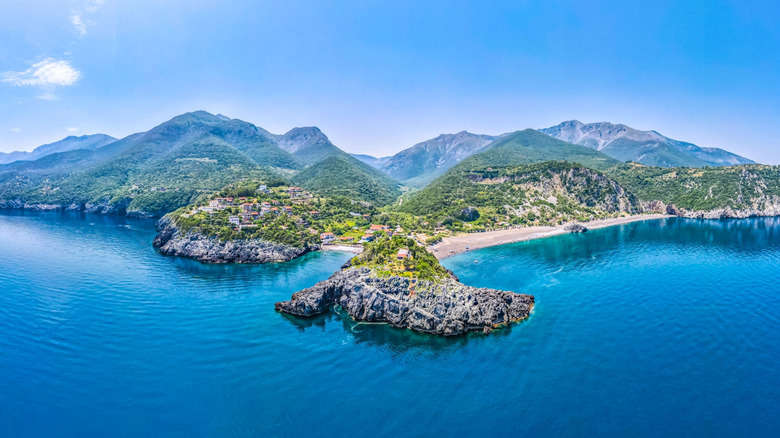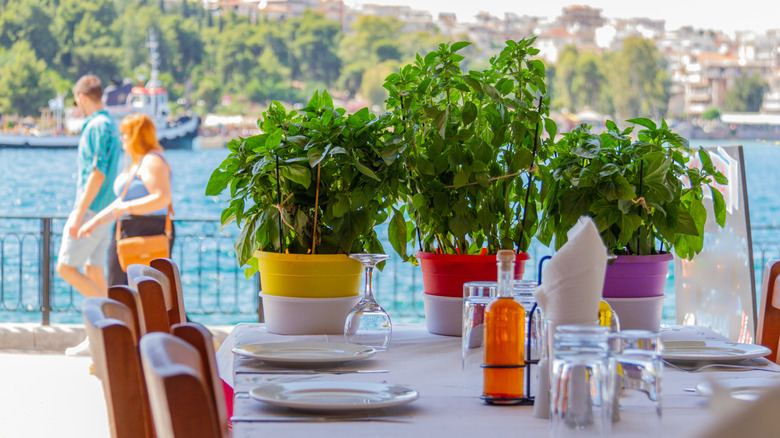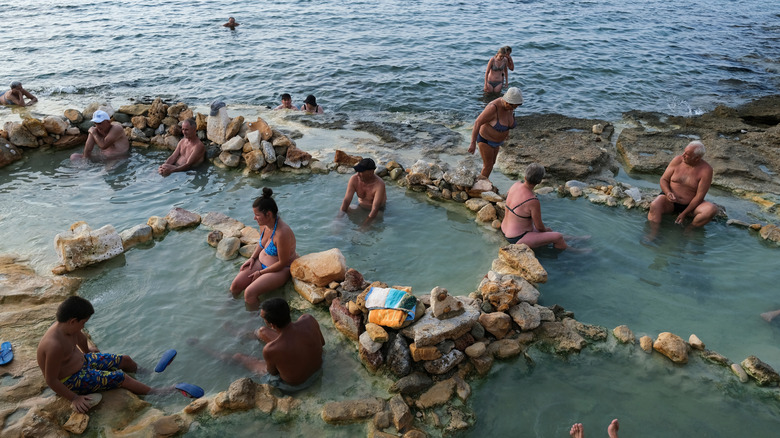Greece's Second Largest Island Is A Wildly Underrated Mediterranean Getaway With Pristine Beaches And Mountains
Is there even such a thing as a Greek island not overrun with tourists anymore? But of course! We may be well past the days when it was possible to enjoy the most popular Greek islands without swarms of visitors, but Greece's second-largest island, Evia (or Euboea), has a quaint appeal, perfect for a placid holiday removed from the better-known islands' over-excitement. Its uninhabited beaches and still mountain forests often get overlooked in favor of the volcanic sands and Instagrammable sunsets of Crete, Santorini, and Mykonos.
Located just off the mainland, Evia can be accessed by bridge but is still surrounded by Mediterranean waters. It may not be as remote as the pristine and affordable island of Kalymnos, but its proximity to Athens (which has an international airport) — at just a 1.5-hour drive (or bus ride) northeast — and its affordable ease of access are precisely what make Evia appealing to off-the-beaten-path travelers. It combines the best of mainland culture with island bliss, peppered with ancient and medieval history and a bounty of natural scenery.
Exploring Evia through culture and cuisine
As the entry point to the island, Evia's capital, Chalkida, has seen an influx of conquering nations, each of which has influenced local culture over the centuries. Phoenicians, Romans, and Ottomans all once claimed the city, and in fact, its size once superseded Athens! Located on the sunny Evripos Strait with a buzzing waterfront, it's an obvious getaway for Athenians, but overlooked by foreign travelers. Eretria, just 20 minutes down the island's south coast, hosts archaeological ruins and a museum dedicated to this once-major port. Further along, Limni presents the picture-perfect seaside village, full of terra-cotta-topped houses and bougainvillea spilling down the alleyways, while Karystos' shoreline glistens with its 14th-century Venetian Bourtzi fortress.
More historical architecture awaits outside the towns: the Turk-Venetian Karababa Castle sits high on a hill outside Chalkida, just across the bridge to the mainland. The 16th-century Saint David of Evia Monastery in the inland highlands of Rovies was built by the monk whose name it bears, remembered as a beloved teacher of the enslaved Greeks. Ruins from the Helladic, Hellenic, and Mycenaean eras can be found all over Evia. To the north, you can explore the scenic ruins of medieval towers in Messapia and the 13th-century Church of Agios Dimitrios in Avlonari.
Of course, one of the best ways to experience any Greek island's culture is through its fresh, rustic cuisine. Some of the most interesting local specialties include a filo pastry stuffed with sourdough and soft touloumotiri cheese called tiropitari, a nugget-shaped pasta known as kourkoumpinia, and slow-cooked vouloto lamb. Fresh seafood from the Evian Gulf includes smoked seabass, tuna ceviche, anchovies, and gilt-head bream carpaccio. Taverns let you pair meals with ouzo or tsipouro (an unaged grape spirit), or try tasting local wine varietals like Malagouzia and Savatiano.
Discovering Evia's natural delights
Evia's best beaches lie on the northeast coast, facing the gentle surf of the Aegean Sea. Chiliadou has a popular golden stretch, backdropped by green hills. Pebbly Agia Anna is dotted with beach bars, cafes, and a sunny esplanade. Limnionas Beach lies next to a secluded cove and typically has tranquil tides in the shadow of Mount Kerkis. Mourteri Beach's golden sands are practically untouched, making it perfect for private sunbathing.
The island is also home to one of the oldest spa towns in Greece: Edipsos. It has one of the most luxurious hot springs with incredible views in the world, full of tiered rock pools overlooking the Aegean. In addition to the upscale, neoclassical Thermae Sylla Spa & Wellness Hotel, there are freely accessible pools and baths by the beach, with temperatures ranging from 82 to 186 degrees Fahrenheit. The waters' supposed curative powers treat not just every form of chronic inflammation, but also gynecological disorders and infertility. This potent reputation has attracted both celebrated names of the last century (like Winston Churchill, Omar Sharif, and Greta Garbo) and famed ancients, including Aristotle and Marcus Aurelius.
The Kavo Doro promontory to the southeast is a pleasant coastal walk, littered with legends of gold coins buried in its seabeds, lost by ships wrecked while trying to pass the dangerous Kafireas Strait. A trek to the top of the nearby Mount Ochi reveals drakospita — monolithic houses built of limestone slabs that resemble dragon scales. The beloved hike to the nearby Dimosari Gorge is shaded by wild olive, pear, and oak trees, following a stream of natural pools along a 6-mile trail leading to the sea. And the forested Dirfis in central Evia resemble the Swiss Alps, with panoramic views across both the mainland and the Mediterranean.


